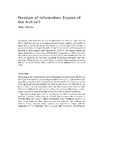| dc.contributor.author | Sebina, P. | |
| dc.date.accessioned | 2011-03-16T08:55:40Z | |
| dc.date.available | 2011-03-16T08:55:40Z | |
| dc.date.issued | 2009 | |
| dc.identifier.citation | Sebina, P. (2009) Freedom of information: erosion of the archive?, Journal of the Society of Archivists, Vol. 30. No. 2, pp. 147-165 | en_US |
| dc.identifier.issn | 0037-9816 (print); 1465-3907 (online | |
| dc.identifier.uri | http://hdl.handle.net/10311/755 | |
| dc.description.abstract | The passing of the Promotion of Access to Information Act (PAIA) in South Africa in 2000 ushered in a new era in accessing government records. Members of the public no longer have to wait for 20 years for government records to become archives in order to gain access to them. PAIA gave the public the right of access to all records irrespective of
age except for those exempted under the provisions of the Act. This chapter evaluates the
impact that Freedom of Information (FOI) legislation in general and PAIA in particular
have had on access policies and practices in South Africa, and examines the extent to which this legislation has been used successfully by historians, journalists and other researchers. While the focus is on South Africa, the chapter further examines the lessons
that the rest of sub-Saharan Africa could draw from the implementation and use of PAIA. | en_US |
| dc.language.iso | en | en_US |
| dc.publisher | Routledge (Taylor and Francis) www.routledge.com | en_US |
| dc.subject | Information freedom | en_US |
| dc.subject | Erosion | en_US |
| dc.subject | Archive | en_US |
| dc.subject | Information access | en_US |
| dc.title | Freedom of information: erosion of the archive? | en_US |
| dc.type | Published Article | en_US |

